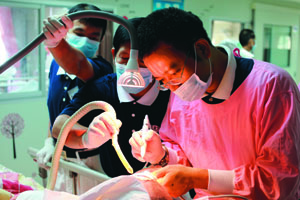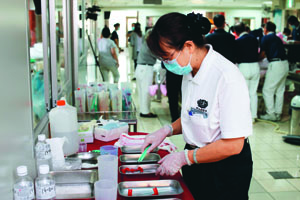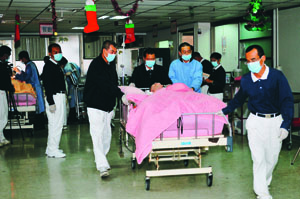

| Clean Teeth for the Helpless | ||||
| By Zhang Li-yu, Yuan Shu-zhen, Lin Nai-zhen, Xu Yu-hua, and Zhang Mei-rong Translated by Tang Yau-yang Photos by Li Wen-shan | ||||
Patients lingering in persistent vegetative states are trapped helpless in paralyzed bodies, and they must rely on others to take care of their every need. They even need someone to brush their teeth. Like everyone else, they must have their teeth regularly cleaned by a dentist to avoid a build-up of plaque. Members of the Tzu Chi International Medical Association regularly visit nursing homes run by the Genesis Social Welfare Foundation. There they offer free teeth cleaning services to improve the oral hygiene of incapacitated residents.
Patients in a persistent or permanent vegetative state suffer from severe brain damage, exhibiting partial arousal but little to no awareness. They are not comatose, but like those in a coma, they must rely on others to take care of their every need, from turning in bed to taking in nourishment. Although they can no longer interact with the world normally, all their physiological needs remain the same. For instance, their teeth, if not cleaned properly, experience a build-up of plaque just as much as those of any able-bodied person. But transporting these patients to dental clinics poses immense practical challenges. Therefore, members of the Tzu Chi International Medical Association (TIMA) regularly visit and clean the teeth of such patients in nursing homes operated by the Genesis Social Welfare Foundation. These homes, located in the central Taiwanese areas of Miaoli, Taichung, and Caotun, take care of people in vegetative or near-vegetative states. Early one Sunday morning, the multipurpose room at the Genesis Foundation’s nursing home in Miaoli was a busy place, as TIMA medical professionals and volunteers were cleaning teeth for resident patients. Nursing home staff and Tzu Chi volunteers bustled around. When the service for one patient was completed, the bed was wheeled back to the patient’s room and another bed was rolled into the vacated spot so that another resident could receive treatment. Other beds were waiting in the wings, so the volunteers were kept busy. The sound of dental cleaning instruments and suction devices filled the air. Dental treatment ranks high on the list of things that unnerve people, and that was also true for the residents of the nursing home. The patients were understandably uneasy or downright scared. So in addition to the dentists, volunteers worked with the patients to soothe them. Some held the suction device in place to remove water, plaque, and blood from the patient’s mouth during the cleaning process. Others held a light at the right place and right angle so the dentist could clearly see his or her target. Li Jiu-lin (李玖霖) was an 11th grader at Miaoli Senior High School. This was the first time he had volunteered at a Tzu Chi teeth cleaning service. His father, Li Dong-ji (李東吉), had invited him along. The father and son worked with the same dentist, one holding a suction tube and the other an overhead light, so the dentist could concentrate on the cleaning. “The light isn’t heavy, but my heart is [from witnessing people in a vegetative state],” the teenager said. More experienced Tzu Chi volunteers occasionally needed to remind him to adjust the light to zero in on the area that the dentist was working on. Probably out of fear of pain, one patient, A-zhong, turned his face away from the dentist to avoid the treatment. The volunteers on either side of him soothed him and persuaded him to cooperate with the dentist, who had had to adjust his own position and angle every which way to get a clear view of the inside of A-zhong’s mouth. A female patient, new to the home, panicked and shook her head unceasingly when a caregiver at the nursing home tried to put a suction tube into her mouth. Tears rolling down her face, she simply would not open her mouth. Zeng Mian-mei (曾綿美), the director of the nursing home, stood beside her and said to her, “It’s all right. Don’t cry. It’ll be over in just a moment.” Meanwhile, Dr. Huang Xiang-xun (黃祥勛) gently rubbed her face with his own hands to relax her muscles. After a while, she finally opened her mouth. “Great job!” everyone said to her. Jumping at the opportunity, Dr. Huang began to work carefully and thoroughly on her teeth.
The event Cleaning teeth for the residents of the nursing home in Miaoli first started in May 2011. Since then, TIMA members in central Taiwan have gone there on the third Sunday of every other month, working on over 30 residents each time. Cleaning one patient’s teeth requires the help of five or six volunteers. Huang Ru-mai (黃如邁), a nurse at the home, pointed out that it was difficult for residents to get dental treatment at most regular clinics. She was so touched to see Tzu Chi volunteers coo to the patients as if they were small children and dentists carefully care for their teeth that she gave up her days off to join volunteers when they came on-site to clean teeth. In the process of cleaning teeth for nursing home residents, Dr. Li Yi-bang (李彝邦) realized that he needed a custom-made suction device. He eventually made one himself. He adapted a vacuum machine for this purpose. His contraption, though still as loud as a vacuum machine, does a fine job of removing the mixture of saliva, blood, and loosened mineralized plaque before a patient can swallow it. After serving these patients for some time, Dr. Li moved to eastern Taiwan to work at Hualien Tzu Chi Hospital. Before leaving, though, he took his successor, Dr. Huang Shu-xian (黃淑賢), to patient rooms at the nursing home. He explained to her in great detail the medical history of each resident and their idiosyncrasies so that she would have an easier time taking over their care. Before starting each session, Dr. Huang works with the home’s caregivers to relax the patient. “Look, the neck feels tense here,” she pointed out to one caregiver. “Massage harder. Good, just like that.” It has been more than a year since she took over from Dr. Li, and she has become quite at ease with the job. “They can’t express themselves [freely], so we need to put ourselves in their shoes,” Huang said of the residents. “When we’re healthy and able-bodied, we should make the best use of every moment to serve. Don’t let time slip by you!” Volunteer You Shu-zhen (游淑貞) is in charge of sterilizing the instruments. She’s done this since 2012, and she knows she is performing a meaningful task for patients in vegetative states. Used instruments are taken back to Taichung Tzu Chi Hospital, where they are first washed with detergent, sterilized with ultrasound, and then soaked in disinfecting solution. When they have dried, they are sealed until the next teeth cleaning service.
Were it not for their condition, some of the patients would be in their best, most productive years. But sadly, their conditions have left them with little self-control. The sight of these patients makes the volunteers’ hearts go out to them. There are signs hanging from the bed frames at the foot of patients’ beds: “Please talk to me,” “Please gently pat my back to help me relax,” “I enjoy listening to music,” and “Please read the newspaper to me.” These signs are considerate gestures by the nursing home staff to help visitors interact with the residents. Yan Yin-fen (顏吟芬) has been a nurse at the home for six years. When she first started working there, she saw veteran nurses talking to these seemingly unresponsive patients and wondered why they did that. “Now, I know how to better care for the residents, and I talk to them too,” Yan said. She pointed out that people in vegetative states are, contrary to popular belief, not entirely deprived of their senses. Interacting with them—such as singing to them or turning them over in bed—especially over a long period of time, might elicit some reaction from them. Some of them even cry or laugh. It is such minuscule and sometimes almost imperceptible patient reactions that give Yan a sense of on-the-job achievement. One of the interactions that nurses have with their patients is brushing their teeth, but their efforts to maintain patients’ oral hygiene produced unsatisfactory results. One indicator was persistent bad breath among patients. “We’ve seen vast improvements in their breath ever since Tzu Chi volunteers started coming here to clean their teeth,” Yan marveled. “Now their teeth are cleaner and much easier for us to care for. I’m most grateful to the TIMA dentists.”
She is my family Every Sunday, Mr. Lu takes a bus from Toufen to Zhunan, where he hops on a train to Miaoli. He makes this journey to see his wife, who has been a resident at the nursing home for a long time. The passing of time has not reduced his love for her. “I once took her home, but I did a poor job of suctioning phlegm for her and she kept coughing. In the end, I had to bring her back here,” Lu said. “Now, I call every night and chat with the nurse here to check on her condition.” He is grateful to the Genesis Social Welfare Foundation for taking care of his wife so he can work. On this day, after Lu’s wife had had her teeth cleaned, Lu and volunteers pushed her bed back to her room. She kept looking back at him, and she slowly moved her hand to the edge of the bed. Lu smiled and said, “She’s in a very good mood now, and she wants me to hold her hand.” After all the teeth cleaning had been done and all the patients had been wheeled back to their rooms, the volunteers cleaned up the multipurpose room and got ready to return to Taichung. They had just completed another journey of abundant love. They knew that there was a distressed family behind each person in a vegetative state, so they would go back in another two months to help ease a little more of their suffering.
|
















|



